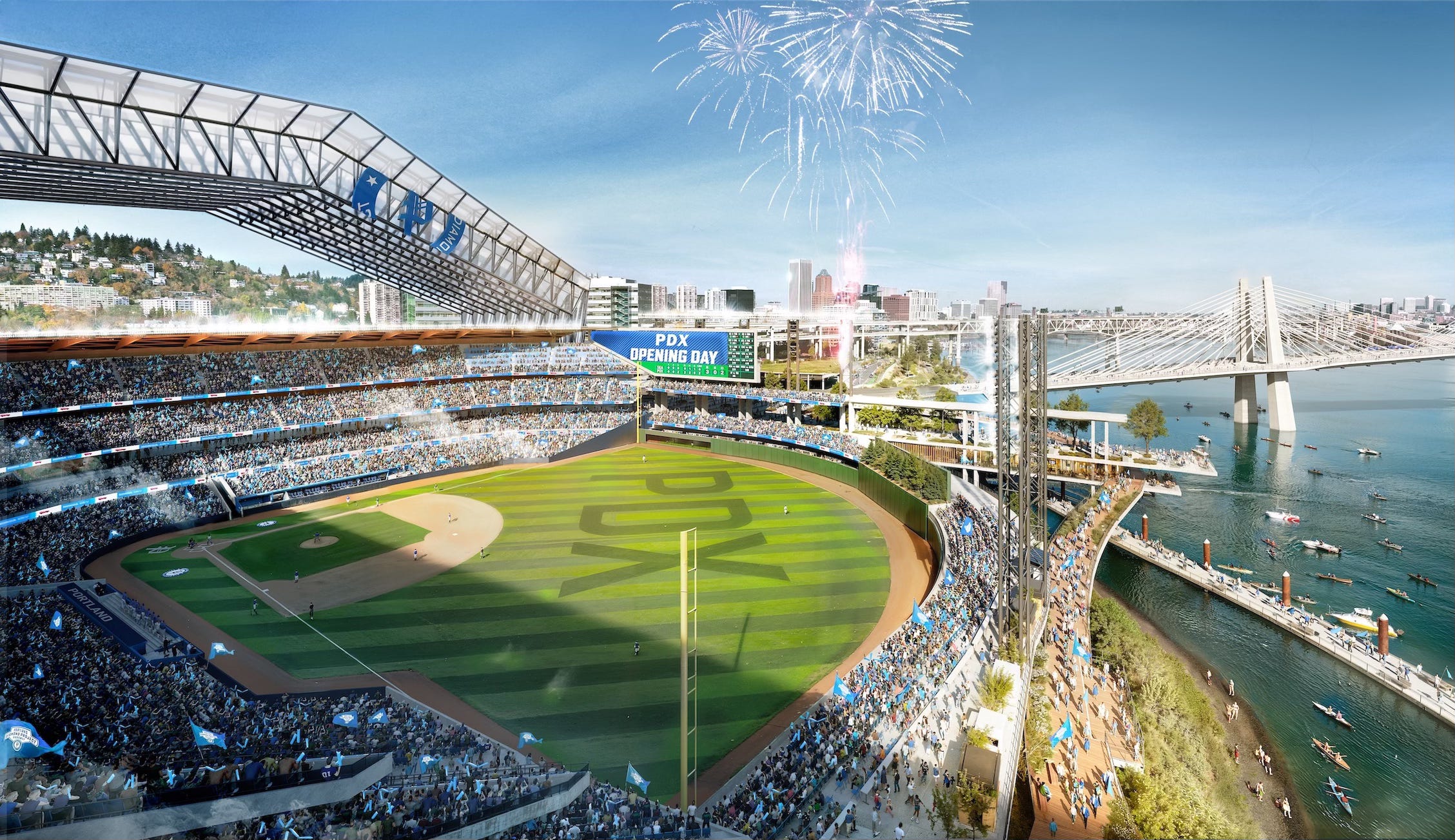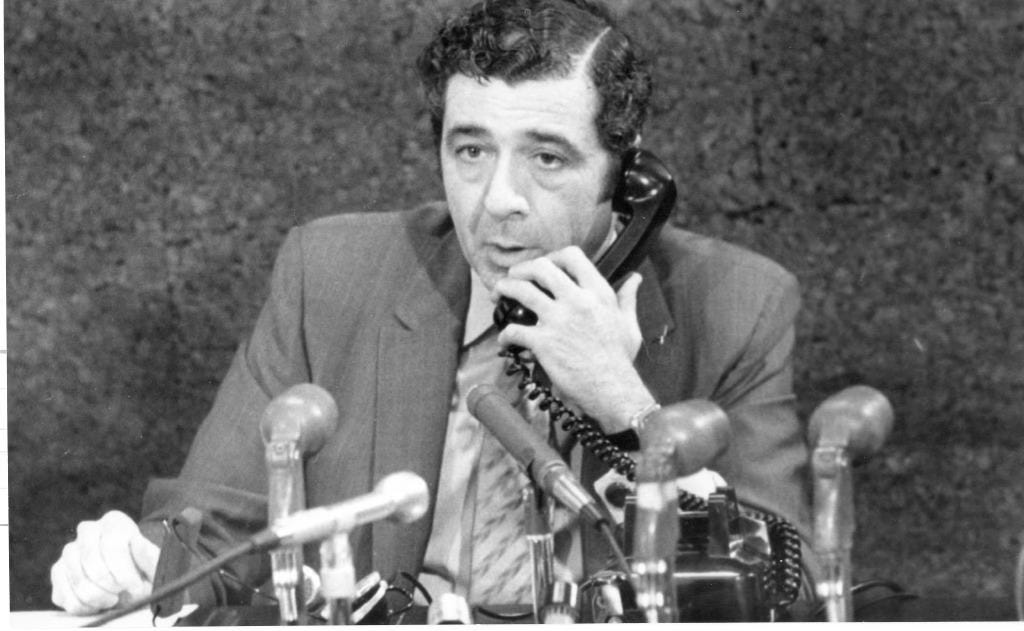Canzano: “If we don’t believe in our future, why would they?”
MLB to PDX stadium effort gets a win.
I had coffee with Harry Glickman several times before he died. The founding father of the Trail Blazers franchise was a visionary who made no small plans.
Glickman, the son of Polish Jewish immigrants, promoted championship boxing matches and pro hockey, brought actress Judy Garland out for a tour, and convinced NFL Commissioner Pete Rozelle to bring preseason games to Portland.
I thought about Glickman on Thursday as state senators from both parties in Oregon backed the $800 million “jock tax” that will help finance a prospective stadium for Major League Baseball on Portland’s South Waterfront.
Before the vote, state representative Mark Meek stood on the Senate floor in Salem and belted a booming rendition of “Take Me Out to the Ball Game.”
Harry would have loved the scene.
Two days earlier, the Salt Lake City City Council voted unanimously to approve the rezoning of 93 acres in the Power District for a potential MLB stadium. The effort is well organized, focused, has an ownership group in place, and is working hard to position itself for potential MLB expansion.
SLC presents as a fierce opponent, doesn’t it?
Ready for a fight, PDX?
Glickman talked for hours over coffee about the opposition he encountered while trying to land that NBA franchise. He also lamented that the Seahawks should have belonged to Portland instead of Seattle.
Voters in the 1960s narrowly defeated a measure that would have funded a 46,000-seat enclosed stadium known as the Delta Dome. A few local news outlets led the charge against it, pointing out that Memorial Coliseum was already bleeding and had no permanent tenant.
Glickman eventually landed the Blazers. He eventually solved the tenancy issue himself. The Delta Dome was a missed opportunity. It would have put an NFL franchise in Portland and positioned the city as a potential Olympic host.
“That cause of death,” Glickman said, “was small thinking.”
The Portland Diamond Project faces a big lift and formidable competition from the effort in Salt Lake City. But it’s the opposition from within state lines I remain puzzled by. What’s driving it? Who could be against raising the profile of a city? Maybe contrarians just like being contrary.
There’s a significant amount of time and money being spent privately to position Portland as an attractive candidate should MLB decide to expand.
The pieces are coming together.
None of it looks easy.
City and state officials are lined up politically for the first time. But MLB owners have to believe in Portland for this to be a viable candidate. As one involved party told me this week: “If we don’t believe in our future, why would they?”
Glickman didn’t have the money for an NBA team when he started. Who would own the NBA operation? Did he have a whale investor lined up? If so, who was it? Those incapable of attempting big things sometimes take comfort in sitting back and shooting holes in the visions of those who dare.
“Some people are so poor, all they have is money.”
Bob Marley might have said that. Or maybe it was someone else. But you might as well attribute the sentiment of that quote to Glickman, who scrambled around the country, selling his enthusiastic NBA concept to wealthy men until he found the funding. He was a doer who had little time for doubters.
Glickman had other problems, too. NBA owners didn’t take Portland seriously as an expansion market at that time. He started lobbying the league’s owners. Glickman told me he paid a visit to New York City and met with Knicks founder, Ned Irish, in his offices.
Irish scoffed.
He told Glickman: “How am I going to put the name ‘Portland’ on the marquee at Madison Square Garden?”
Republicans and Democrats don’t agree much these days. But they united on Thursday and decided that taxing the salaries of MLB players such as Aaron Judge and Shohei Ohtani is a great way to help fund a ballpark construction project in Oregon. I suppose none of us should be surprised that there’s still opposition out there, rooting against it.
Easier to build a ballpark from scratch?
Or sit back and shoot spitwads through a straw at those who are trying?
The $800 million question now advances to the Oregon House of Representatives. Representatives from 60 districts across the state will vote on whether to support the amendment to SB110. Whisper is, the votes are there. Again, no new tax dollars here. No bond if MLB never expands. It’s a no-brainer for me.
After that, it lands on Governor Tina Kotek’s desk.
Glickman would have loved the developments of this week. It was the kind of stuff that got his entrepreneurial juices going. Near the end of his life, he arrived in a wheelchair for our coffee dates. He moved a little slower, but his brain was always racing ahead.
“Portland is a baseball town,” he always said.
The guy loved a challenge. All those years ago, Glickman aimed to bring a major league professional sports franchise to a city that had never had one. He landed an NBA franchise. Before that, Glickman got so many doors slammed in his face that he lost count.
He just kept knocking.
“It’s what you do,” he said.




Great column and well written, as usual. But here's a contrarian view from 2,400 miles away. When you mention Salt Lake City back here, people talk about Mormons, law and order, a straight-laced, no risk City. When the topic of Portland, Oregon, comes up, one word is prevalent: Antifa. Then comes the perception of a deserted downtown area, boarded up and waiting to collapse, courtesy of... Antifa. True or false, that's the perception. If you were an MLB owner, which would you choose? Portland's got just two chances for major league baseball choose Portland in my humble opinion: "Phil" and "Knight".
“That cause of death,” Glickman said, “was small thinking.”
That's long been the problem in this region. Too many people not only afraid of thinking big, but who also hate the idea of someone else doing so.
(It’d be great if some of you guys could resist the temptation to make this about your personal politics.)